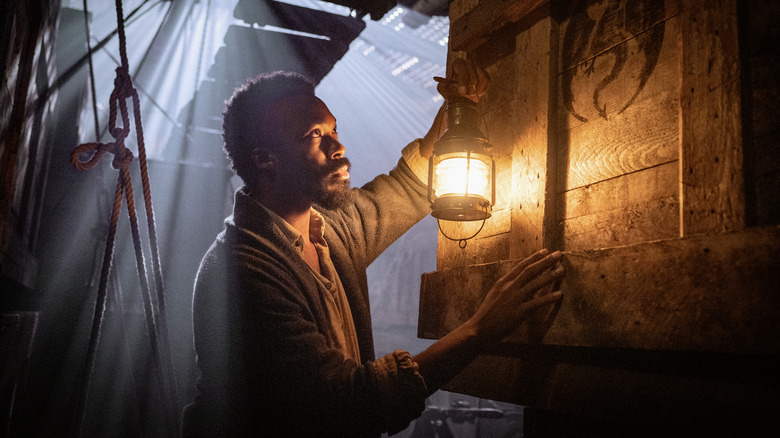The Last Voyage Of The Demeter Is A Reminder That One-Location Horror Movies Freakin' Rule
This post contains spoilers for "The Last Voyage of the Demeter."
Dracula might have been around for centuries as of the beginning of Bram Stoker's "Dracula," but the latest film featuring the undead vampire — "The Last Voyage of the Demeter" – represents something of a dying breed these days. Much will (and has) be written about the obvious parallels drawn between this and 1979's "Alien," but there remains an important lesson to be learned from the success of Ridley Scott's horror masterpiece. By and large, the genre thrives in simplicity. And when writers constrain themselves by setting a story in one location, those limits paradoxically allow for more storytelling possibilities to leap off the screen.
"Demeter," directed by Norwegian filmmaker André Øvredal from a script by Bragi F. Schut and Zak Olkewicz, takes full advantage of its ship-bound parameters. With the exception of the opening flashforward on the shores of England and the initial act centered on a port in Romania, the adaptation wastes little time establishing the Demeter itself as a safe haven. (A "home," as David Dastmalchian's first mate and captain-to-be Wojchek calls it by the final act of the story.) But it soon doubles as a death trap once the sleeping Dracula is fully unleashed on the unsuspecting crew. The rickety ship isn't quite as instantly iconic as the Nostromo, mind you, but the film's heart is certainly in the right place.
More to the point, the effectiveness of the atmosphere and the creativity of the set pieces in "The Last Voyage of the Demeter" reinforce the notion that far too many horror movies are wasting a golden opportunity. Decades after "Alien" ushered in a new era for the genre, "Demeter" once again proves that one-location thrillers need to make a comeback.
Location, location, location
As far as "hooks" go when pitching a horror script, you can't go wrong finding a way to dump several characters in a single location, introduce some nefarious threat that they're physically unable to escape from, and keep finding interesting ways to drive up the tension and fully exploit the scare factor. Aside from the obvious drama inherent in such a premise, the best part of this approach is that it allows different filmmakers to put their own unique spin on this time-honored setup. "The Last Voyage of the Demeter" benefits from the ready-made potential of Bram Stoker's original "Dracula" novel, which featured a short chapter chronicling Dracula's journey to Europe aboard a ship. Taking that basic foundation and running with it, André Øvredal filled in the gaps and mixed the epic, sweeping tone of "Master & Commander" with the sense of dread and rising tension from "The Thing," and the atmospheric doom hanging heavy over "Alien."
While relatively restrained, small-scale movies like "Demeter" feel like more of an outlier with each passing year, recent history gives us a number of examples that further confirmed the appeal of these one-location horror flicks. Dan Trachtenberg's "10 Cloverfield Lane" might be the epitome of this subgenre, wringing every possible ounce of conflict and stakes out of a doomsday bunker that may or may not be protecting the three characters inside from an apocalypse. Jordan Peele took this even further with "Get Out," trapping its protagonist in the worst place imaginable: An affluent white family's home. Hell, the entire history of haunted house stories intuitively understands why audiences keep getting drawn back to this setup.
"Demeter" injected new life (in a manner of speaking) into one of the best weapons in the horror toolbox. It should only be the start.

